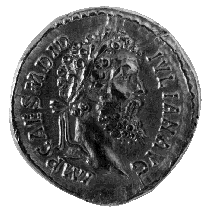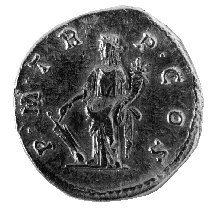



(109) Didius Julianus - AV aureus, A.D. 193, 6.81 g. (inv. 91.192).
Obverse: Laureate head of Didius Julianus r.; IMP(ERATOR) CAES(AR) M(ARCVS)
DID(IVS) IVLIAN(VS) AVG(VSTVS): Imperator Caesar Marcus Didius Julianus
Augustus.
Reverse: Fortuna standing l., holding rudder on globe in r., cornucopia
in l.; P(ONTIFEX) M(AXIMVS) TR(IBVNICIA) P(OTESTATE) CO(N)S(VL): Pontifex
maximus, with tribunician power, consul.
Provenance: Ex H.P. Hall collection; Jameson collection; Quelen collection;
Numismatic Fine Arts, 1989.
Bibliography: H. Mattingly and E.A. Sydenham, The Roman Imperial Coinage
IV.1: Pertinax to Geta (London 1936) 2.
Marcus Didius Severus Julianus was born to a prominent family in Milan,
was consul with Pertinax in A.D. 174 or 175, and governed Africa
and a number of military provinces. When the emperor Pertinax was murdered
by the praetorian guard, the very wealthy Julianus and the urban prefect
(and father-in-law of Pertinax), Flavius Sulpicianus, literally conducted
a bidding war for the empire, offering donatives to secure the support of
the praetorians. Julianus won, promising 25,000 sestertii per man. Meanwhile,
Septimius Severus, who on the death of Pertinax had been acclaimed emperor
by his troops, marched on Rome, where the Senate abandoned and condemned
Julianus. Julianus ruled for 66 days.
The coins of Julianus ironically emphasize military concord and imperial
good fortune. His portraits, known only from his coins, resemble those of
Pertinax in type, but they lack the strength and resolve of his predecessor's.
The reverse of this aureus depicts the goddess Fortuna, who determined the
fate of the emperor and the empire. She holds her usual attributes, a rudder
on a globe, which refers to her guidance of the world, and a cornucopia,
symbol of the prosperity she brings.
C.L.L.



All contents copyright (c) 1996.
Lawrence University
All rights reserved.